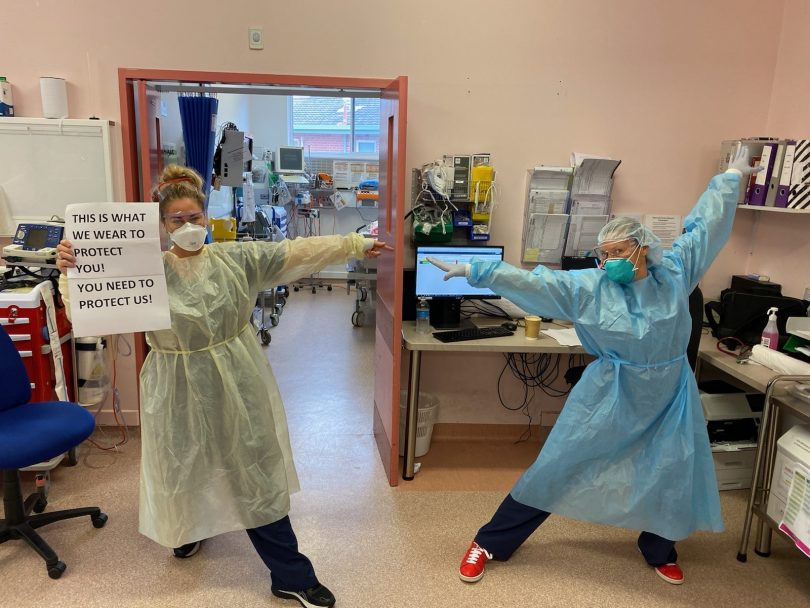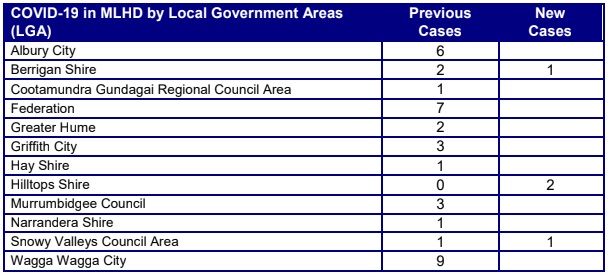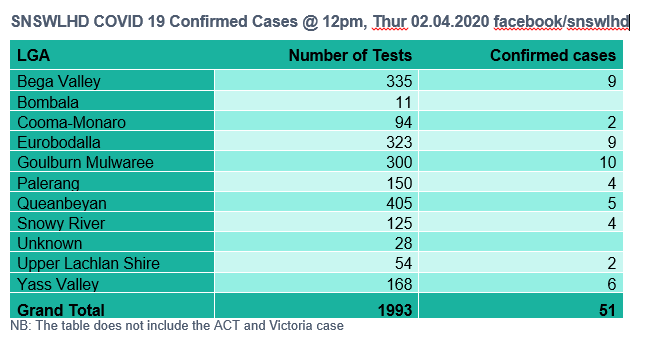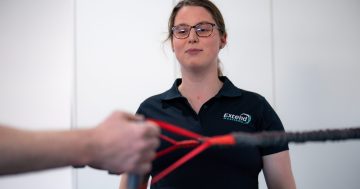
Southern NSW LHD staff practising social distancing in personal protective equipment. Photo: SNSWLHD Facebook.
Hilltops local government area now joins the list of COVID-19 affected shires in the Murrumbidgee Local Health District (MLHD). Two positive COVID-19 cases have been identified in the shire bordered by Boorowa, Harden Murrumburrah, Jugiong and Young in the past 24 hours.

Murrumbidgee LHD figures now include two cases in the Hilltops Shire. Image: MLHD Facebook.
Berrigan Shire and Snowy Valleys Council area have also recorded increases of one case each, taking the total number of COVID-19 positive people in the MLHD to 40. This includes one Victorian resident who is self-isolating in NSW and not considered a source of infection for the MLHD.
The 39 locally diagnosed cases indicate that the likely source of infection was overseas (37 cases), one from interstate and one local. A total of 1814 people have been tested in the MLHD since the outbreak of COVID-19.

Southern NSW Local Health District infections continue to rise. Image: SNSWLHD Facebook.
In Southern NSW, there is a total of 51 cases of COVID-19, following 1993 tests. There are now nine cases in both Bega Valley and The Eurobodalla, ten in Goulburn Mulwaree and five in Queanbeyan. None of the new confirmed cases have required hospitalisation and are self-isolating accordingly.
Of the positive recorded cases – the MLHD demographic still favours the predominately female 20-29 year old age bracket, but 16 cases fall in the 60-79 year age bracket.
The MLHD has established testing clinics in Wagga, Griffith, Cootamundra, Deniliquin and Tumut.
Members of the public are being asked to remain calm and be vigilant in their hand hygiene and practice social distancing.
While many people are expected to experience mild to moderate symptoms, which can be managed at home with the support of health care workers, those people in the MLHD region who experience more serious symptoms will need specialist care in an appropriate local hospital. Base Hospitals are equipped to support people with severe COVID-19 symptoms.
People who are most vulnerable are people over 70, people over 60 with chronic and complex illness, or people with weakened immunity and Aboriginal people with chronic illness.
The most common symptoms of COVID-19 are fever, sore throat and dry cough. Symptoms will generally appear three to four days after exposure to the virus but can be up to 14 days later.
Members of the public are advised to minimise travel, increase personal awareness around hand hygiene and practice social distancing.
Anyone who believes they have may have contracted the COVID-19 virus (ie returned travellers, or those who have come in contact with a confirmed case and are showing symptoms: fever, sore throat, dry cough and shortness of breath) are advised in the first instance to:
- Call the free-call coronavirus hotline 1800 022 222 and receive advice on the best course of action depending on your symptoms and risks. Medical staff will direct people to the nearest hospital or respiratory clinic, or advise them to stay home and self-monitor, or contact their GP, or
- Contact your GP to arrange an appointment (let GP practice know in advance if you have symptoms) or the Southern NSWLHD Central Intake Service – 1800 999 880 (option 1) before attending
- Call the Murrumbidgee COVID-19 Hotline on 1800 831 099 for assessment (7:00 am – 11:00 pm)







